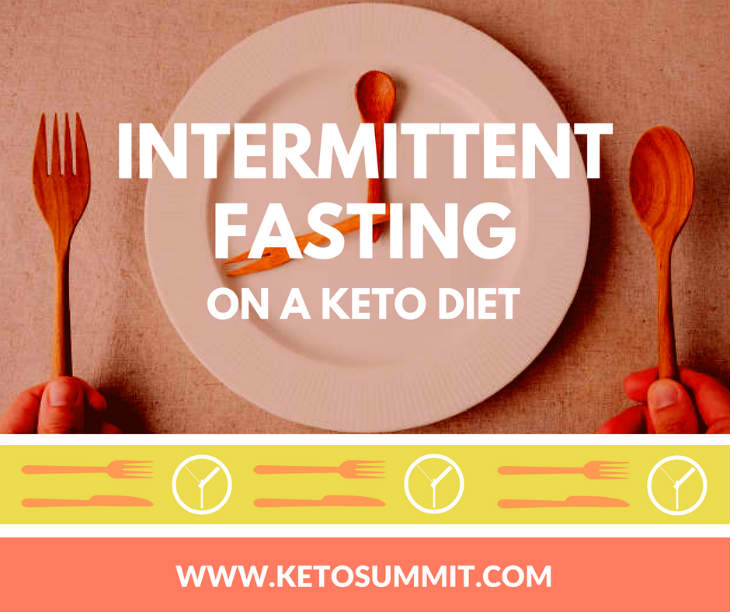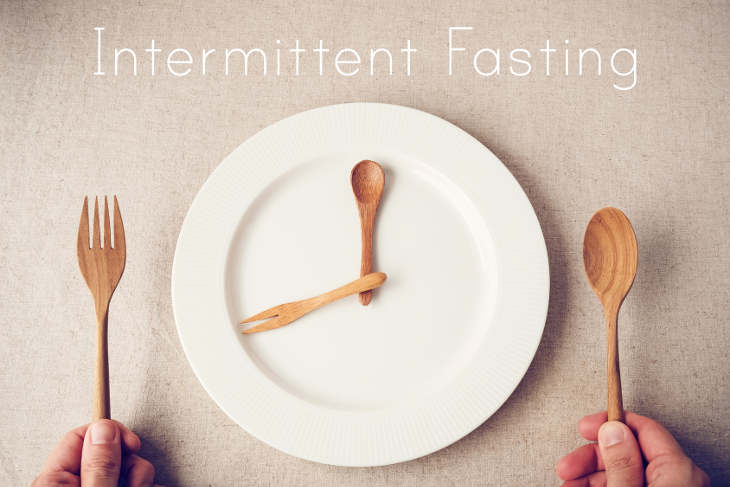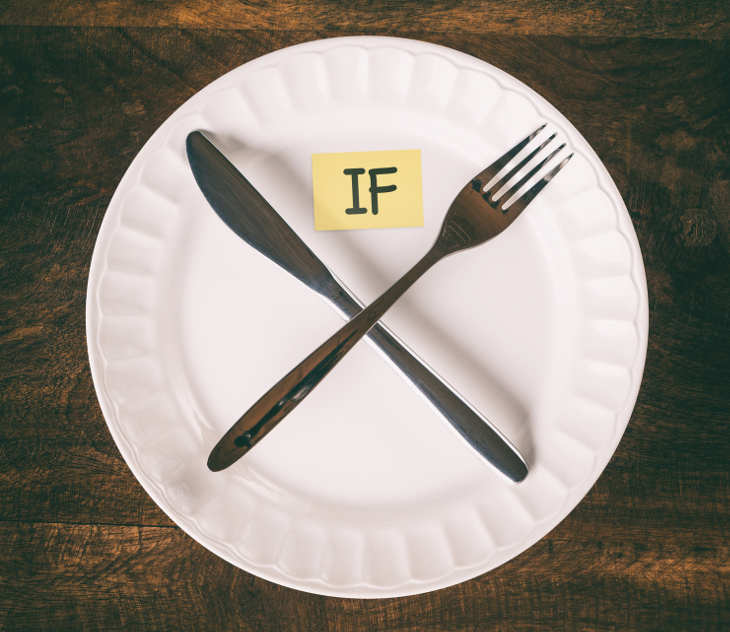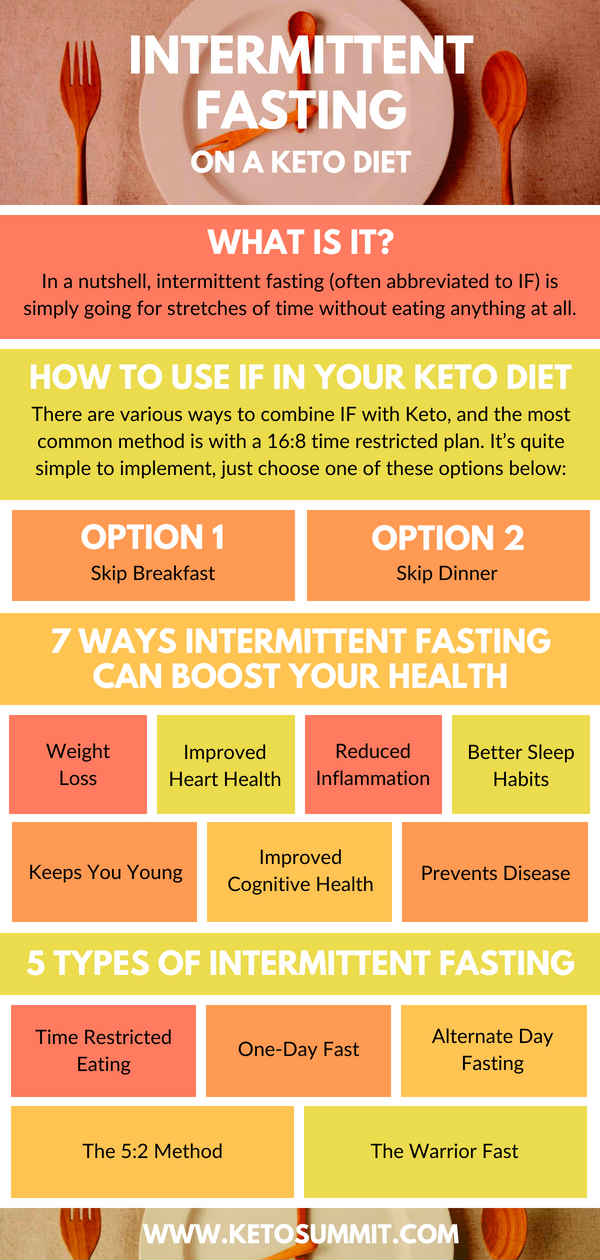Keto Fasting: Intermittent Fasting on A Keto Diet
Whether you’re following Keto for weight loss or for overall health benefits, it’s highly likely you’ve encountered the concept of intermittent fasting.
Don’t worry, we’re not going to be talking about starving yourself today, and there’s no reason you should feel compelled to fast.
If this idea is something that interests you, though, you’re in for a treat today.
Read on and find out if intermittent fasting while following the Ketogenic diet seems like an appropriate course of action for you to meet your goals.

Here’s the Quick Scoop On Intermittent Fasting (IF)…
In a nutshell, intermittent fasting (often abbreviated to IF) is simply going for stretches of time without eating anything at all.
Rather than counting macros or counting calories, you limit the amount of time in which you have to eat your food.
Nurse Practitioner and Certified Nutritional Therapist Katie Garces, NP, CNT describes why IF is such a powerful tool. “By extending the periods between your meals just a bit, you allow your glucose to lower and give the body a chance to do what it does naturally. Burn fat for energy!”
Is Fasting The Same as Intermittent Fasting?
Sort of. In both regular and IF, you refrain from eating for a given period.
An example of fasting is abstaining from both food and drink for 12 hours before a blood test, or perhaps choosing not to eat during certain religious holidays. It’s not generally something you sustain as part of your day to day schedule.
Intermittent fasting is really a lifestyle in which you cycle between periods of eating and not eating.
How To Use Intermittent Fasting With Your Keto Diet…
According to Amy Myers, M.D., this technique is a great way to quickly get into ketosis. “Intermittent fasting initiates ketogenesis, the production of ketone bodies that occurs during a metabolic state known as ketosis where your body burns stored fat for fuel rather than glucose.”
Ok, let’s suppose you decide to give intermittent fasting a try after reading this article…what do you actually do?
There are various ways to add intermittent fasting to your Keto diet – a combination I like to call Keto fasting. The most common method is with a 16:8 time restricted plan. It’s really quite simple to implement this…just choose one of these options:
OPTION 1 – Skip breakfast
Many people simply skip breakfast. They might have a black coffee and some water in the mornings, but that’s it. Then they eat a Keto lunch with an earlyish Keto dinner. That puts your eating window between noon and 8pm.

2 caveats to this Keto IF option:
- Having a bulletproof Keto coffee in the mornings technically doesn’t count as fasting. You’re ingesting “food” even if those fat calories don’t raise your blood sugar levels or make you more hungry.
- If you have sleep issues, then try option 2 (below) instead, as eating breakfast is a good way of resetting your circadian rhythm. (1)
OPTION 2 – Skip dinner
If you like to get up early and go to bed early, then skipping dinner might be a better option. This can also help reset your circadian rhythm.
Simply eat a delicious low carb breakfast and lunch, and then skip your evening meal. Your eating window would be between 6am and 2pm.
Intermittent fasting can be done a variety of ways. Check out this video for another way:
Do You Have To Do Intermittent Fasting On Keto?
Definitely not.
But many people have found combining IF and Keto can boost weight loss.
As you probably know, one of the effects of following a Ketogenic diet is that your body will enter a state of ketosis.
In ketosis, your body will be depleted of its glycogen stores. When your body needs energy, and there is no glycogen available, it turns to ketones and fat stores to supply itself with the fuel it needs.
Intermittent Fasting helps to deplete glycogen stores so you can get into ketosis faster and stay there longer. As a result, you can more quickly experience the weight loss and other health-boosting benefits of a ketogenic diet.
We’ll look at 7 ways IF can boost your health in a moment, but first, let me answer the question that’s probably in your head right now…
Is Intermittent Fasting Safe?
As with anything in life, there’s no straightforward answer to this question.
What is perfectly safe for one person could be life-threatening to the person sitting next to her.
But don’t panic, we’re certainly not suggesting IF is deadly!
Generally speaking, intermittent fasting is absolutely safe for the vast majority of people.
Later, we will touch upon some reasons you might want to think IF through fully before just launching in.
If you have any questions regarding the safety of this method for you, be sure to raise any concerns you might have with your doctor. It’s always better to be safe than sorry, and doubly so with your health on the line.
7 Ways Intermittent Fasting Can Boost Your Health
“Where diets complicate life, fasting simplifies. Where diets are expensive, fasting is free. Where diets can take time, fasting saves time. Where diets are limited, fasting is available anywhere. Where diets have variable efficacy, fasting has unquestioned efficacy. There is no more powerful method for lowering insulin and decreasing body weight.”
We’ll dive deeper into 7 positive effects you can experience when you restructure your eating window.
1) Weight Loss
Weight loss is a common reason for switching to a ketogenic diet and it would seem intuitive that periods of abstaining from food might be beneficial if you’re trying to lose weight.
While there is a reasonable body of study on the general health benefits of intermittent IF, much of this is drawn from animal research or based on observation of religious fasting. Many human studies have involved relatively small sample sizes. (2)

Still, when it comes to weight loss, there’s quite a bit of evidence for intermittent fasting based on a range of studies. One review showed that 10 out of 13 studies of humans showed that intermittent fasting resulted in weight loss. (3)
Subjects in one trial lost weight in 2 weeks of restricted nighttime eating (no eating between 7 PM and 6 AM) while those in another study dropped an impressive 8% of their initial weight over 8 weeks. (4,5)
If you’re looking to shed a few pounds, incorporating any type of intermittent fasting into your low carb diet can be a useful leg-up.
2) Improved Heart Health
A number of studies of intermittent fasting have demonstrated significant improvements in cardiovascular risk factors, including reductions in total and LDL cholesterol, triglycerides, and blood pressure. (6)
For example, when probing the effects of alternate-day fasting (ADF) in overweight adults, one study found that cardiovascular disease risk factors were reduced after a period of just 8 weeks. (7)
For patients with Chronic Heart Failure switching to a lifestyle incorporating IF can improve chances of survival long-term. (8)
3) Reduced Inflammation
It is generally accepted in the medical community that inflammation caused by obesity can lead to insulin resistance and type 2 diabetes. (9)
Many studies show IF is a sound approach to reducing inflammation. (10,11).
4) Improved Cognitive Health
As we age, our cognitive health begins to deteriorate. (12)
Oxidative stress has repeatedly been linked to increased aging of the brain, and this aging impairs both your memory and your ability to learn. (13)
Following a diet that employs intermittent fasting may help reduce the damage caused by oxidative stress, literally slowing the aging process of the brain. (14, 15)
5) Better Sleep Habits
Adequate sleep is vital to our emotional outlook and our physical health, but far too many of us simply aren’t getting enough shut-eye each night. (16) Running short on sleep is associated with significant health problems, including obesity and diabetes (17,18)
 Intermittent Fasting can play a significant role in regulating your body’s circadian rhythm, or internal clock, including your sleep/wake cycle. (19)
Intermittent Fasting can play a significant role in regulating your body’s circadian rhythm, or internal clock, including your sleep/wake cycle. (19)
6) Keeps You Young
Who wouldn’t like to slow down the process of aging?
Certified Primal Health Coach and Certified Personal Trainer Teresa Heitman, ACE-CPT, says, “IF is anti-aging and life-extending because it spurs autophagy — your body eats its own dysfunctional and dead cells. You lose and gain at the same time. Autophagy also protects against infections and cancer. IF has been shown to improve recovery from surgery, chronic illness, insulin sensitivity, and mood disorders. IF preserves lean muscle.”
We’ve all got this internal clean-up system called autophagy. This process is of critical importance, as it helps prevent disease like cancer, diabetes, and autoimmune diseases. (20)
There is evidence that autophagy slows as we get older, which contributes to the aging process. (21) It stands to reason that supporting autophagy prevents or slows some aspects of aging.
Fortunately, fasting is a great way to induce autophagy (22). However, most of the research in this area is limited to animal studies and often using longer fasts of 24-48 hours. Still, these results signal the possibility of using IF to reduce age-related effects.
Animal studies have also shown that IF can increase lifespan (23).
7) Prevents Disease
Cancer is the second-leading cause of death in the US. (24)
Intermittent Fasting has been shown to reduce cancer-causing metabolic processes in the body. (25)
There is also some evidence that fasting can reduce some of the troublesome side effects experienced by patients undergoing chemotherapy. (26)
Other studies suggest that IF can protect the brain from chronic degenerative diseases, like Alzheimer’s and Parkinson’s (27, 28).
So…
Now you’ve seen that intermittent fasting can deliver a broad spread of benefits, how about the different options at your disposal when it comes to IF?
5 Types of Intermittent Fasting
All intermittent fasting is engineered to meet the same goal: going for a set period without eating.
That said, there are many different paths you can follow when you choose to eat using an intermittent fasting approach to your diet.

Let’s take a look at 5 of those methods right now.
- Time Restricted Eating – This is the most popular form of intermittent fasting. You fast for one segment of the day, and consume all your food for the day during a limited “feeding” window. In a 16:8 plan, for example, you would eat within an 8-hour window each day, perhaps from 11 AM to 7 PM, and fast during the remaining 16 hours. With this IF strategy, a decent portion of fasting is when you would be sleeping anyway, so it shouldn’t prove too difficult.
- The Warrior Fast is essentially an extreme form of time restricted eating. In this IF style, you fast all day and eat just a single large meal at night during a 4-hour eating window.
- One-Day Fast: This is a simple method, and self-explanatory. When adopting a one-day fast approach, you simply choose a suitable day each week and then go without food on that day only. You might choose to start your fast after supper, continue by skipping breakfast and lunch the following day, and then enjoy a hearty dinner. Or instead, you might choose to begin fasting when you wake up and press on through the entire day, only eating the next morning when you wake again. This method is completely flexible so you can bend it to mesh with your lifestyle.
- The 5:2 Method is a variation of the one-day fast. You eat normally for 5 days of the week and then choose 2 days of the week when you restrict your food, rather than one. This is another very simple and workable option.
- Alternate Day Fasting – If the idea of not eating at all for large chunks of time isn’t appealing, you might consider doing a modified fast. With Alternate Day Fasting you eat normally every other day and drastically limit calorie intake to 20-25% of your regular diet on the alternate days. The advantage is that you can still eat during the “fasting” periods – just not as much. Numerous studies indicate this method has health and weight-loss benefits similar to other types of intermittent fasting. (29,30)
Now…
We mentioned earlier that it’s not advisable for everyone to undertake intermittent fasting. Who, then, should think more carefully before diving in?
Are You One Of The People Who SHOULD NOT Be Doing Intermittent Fasting?
Pregnant women should avoid intermittent fasting during pregnancy. If you are wondering what you should be eating during pregnancy, listen to our exclusive interview with Lily Nichols.

You might have been able to go days without eating before, but during pregnancy, your nutritional requirements increase. Research is inconclusive on the safety of intermittent fasting during pregnancy but one study showed an increased risk of low birth weight during the first trimester. (31)
People with an eating disorder should also be careful before forging ahead with an IF regime.
If you are hoping to achieve weight loss or health benefits, but then binge on inappropriate food during your eating window, you’re really missing the point.
Make sure your relationship with food is a good one before taking this journey on.
People who are underweight are not the best candidates for IF, as the restrictive eating schedule is likely to cause additional weight loss.
People with medical conditions or taking medications that could be affected by fasting should discuss intermittent fasting with their doctor before proceeding.
Likewise, if you are unsure or have any questions or concerns about whether intermittent fasting would work for you, please make sure to speak with your doctor.
Simply stated by Registered Dietician Nutritionist Deanna Wolfe, RDN, “I would not recommend it to everyone. People who are underweight, have a history of eating disorders, people with diabetes or problems with blood sugar control, people with any medical condition and people taking medications should never fast without consulting with a doctor first.”
And in all cases, you’ll want to listen to your body. It’s natural to feel a little hungry while adapting to a new diet schedule, but if you feel terrible, stop what you’re doing and eat something! IF may not be right for you right now – and that’s ok.
OK, Ready To Start Intermittent Fasting? Here Are 3 Mistakes To Avoid…
- Don’t blow your macros during your eating window!Bingeing on the wrong types of foods during your eating window will end up undoing all your good work. Eat sensibly rather than reaching for your favorite junk food as a reward for sticking to the plan.
- Don’t get dehydrated!Make sure you are getting enough water. Not only is water important for your overall health, but it can also help you feel full when you get hungry during your fasting window. Also, drinking enough water will help your body to flush the waste accumulated as your body heals during fasting.
- Don’t be obsessed!Don’t obsess over the clock, counting the seconds until you can eat. And don’t become a slave to the timing windows! If dinner is ready 15 minutes before your feeding window officially opens, just eat. Same idea if your meal is slightly late. Obsessing will just bring about unnecessary stress for a few minutes here or there make no meaningful difference.

Can Intermittent Fasting on Keto Work?
Whether you’re looking for weight loss or cellular health benefits, eating a disciplined Ketogenic diet while also fasting intermittently can certainly work.
Sure, you can follow a Keto diet without also committing to IF, and you can follow an IF approach to eating without eating a low carb diet. When you combine these two powerhouse methods, though, you are likely to experience even more effective results in terms of overall health.
Find a method of intermittent fasting that works well for you and try it out. You’ve got nothing to lose…
Except a few inches off your waistline!
Pinterest Image For Intermittent Fasting on a Keto Diet
Please pin the image below so that you and others can quickly and easily refer to the list and learn more about IF and how it could be a great option for you!

